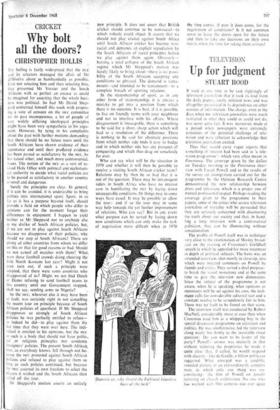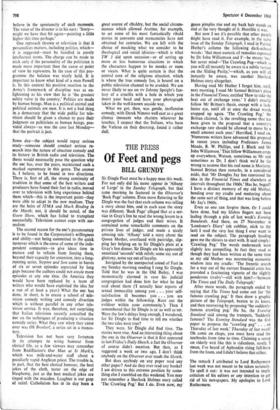Up for judgment
TELEVISION
• STUART HOOD
It used at one time to be said slightingly of television journalism that it took its lead from
the daily papers. rarely initiated news and was altogether parasitical in its dependence on other sources of information. The charge, even in the days when ntic television journalists were much restricted in what they could or could not do. Was never quite fair. It was moreover, made at a period when newspapers were extremely conscious of the potential challenge of tele- vision and were reluctant to acknowledge that television journalism existed.
Thus they would carry vague reports that something of interest had been said in 'a tele- vision programme'—which very often meant in Panorama. The coverage given by the dailies on Tuesday morning to the Panorama inter view with Enoch Powell and to the results of the survey on immigration carried out for the programme by the Opinion Research Centre demonstrated the new relationship between press and television, which is a proper one of mutual professional respect. Perhaps reading the coverage given to the programme in their papers, some of the critics who accuse television journalists of triviality will be persuaded that they are seriously concerned with discovering' the truth about our society and that, in hand- ling a long interview with a controversial politician, they can be illuminating without sensationalism.
The profile of Powell itself was in technique very close to the examination of Mosley broad- cast on the evening of Crossman's Guildhall speech in which he appealed for more treatment in depth of political subjects. The basis was an extended interview, shot mostly in close-up, into which were injected comments on Powell by friends and critics. They served a dual purpose: to break the visual monotony and at the same time to give the interview new dimensions. Since the subject of the programme is not aware, when he is speaking, what opinions or statements will be set against his own, the tech- nique calls for considerable editorial tact and a constant resolve to be scrupulously fair to him. There was no fault to be found on that score.
The interview itself was conducted by Robert MacNeil, considerably more at ease than when Crossman used him as a whipping boy in the special discussion programme on television and politics. He was unobstrusive, led the interview along nicely but firmly to the inevitable ritual question: Do you want to be leader of the party? Powell's answer was masterly in that without violating the proprieties he made it quite clear that, if called, he would respond with alacrity— like de Gaulle, a fellow politician suggested. What emerged was a credible, rounded picture of an extraordinarily complex man, in which only one thing was un- convincing: the film of Powell en famille lecturing on church architecture. No one who has worked with film cameras can ever quite believe in the spontaneity of such moments. The voice of the director is in his ears: 'Sorry— might we have that bit again—pointing a little higher this time perhaps.' One reproach thrown at television is that it personalises matters, including politics, which— it is suggested—must be handled in purely intellectual terms. The charge can be made to stick only if the personality of the politician is made more important than the cause or point of view he represents. In the case of this pro- gramme the balance was nicely held. It is important to know what kind of a man Powell is. In this context his positive reaction to the Army's framework of discipline was as en- lightening as his view that he is 'the greatest safety valve in the country.' Politics are made by human beings. Man is a political animal and political animals are men. It is not a bad thing in. a democracy that the wide public for tele- vision should be given a chance to pass their judgment on politicians as human beings, pro- vided always—as was the case last Monday— that the portrait is just.
Some day—the subject would repay serious study—someone should conduct serious re- search into the nature of situation comedy and its history in British radio and television. The thesis would necessarily pose the question why the sec has, over the years, maintained such a marked supremacy in this genre. The answer is, I believe, to be found in two directions. There is, first of all, the strong continuity of tradition in that some of the best writers and producers have found their feet in radio, moved over to television with long experience behind them which—this is the important point—they were able to adapt to the new medium. They are the heirs of ITMA and Much Binding in the Marsh; not, it should be noted, of the Goon Show, which has failed to transplant successfully. Television cannot cope with sur- realism.
The second reason for themac's paramountcy is to be found in the Corporation's willingness and ability—not being committed to the quick turnover which is the-curse of some of the inde- pendent companies—to give ideas time to mature and to refrain from forcing them, beyond their capacity for extension, into a long- running series. Steptoe and Son came in bursts of six or seven episodes separated by long gaps because the authors could not create more episodes at any one time. (In America they would have been replaced by a team of writers who would have exploited the idea for a run of at least a year.) What the BBC has done, in short, is to create a school of tele-, vision comedy writing and comedy direction which is without parallel in any other tele- vision service. It was, therefore, not surprising that Italian television recently consulted the BBC on the techniques of producing a situation comedy series. What they saw when they came over was Oh Brother!, a series set in a monas- tery.
Television has not been very fortunate in its attempts to wring humour from clerical life, as a few viewers may remember from Rediffusion's Our Man at St Mark's, which was milk-and-water stuff about a peculiarly vapid Anglican priest. The trouble is, in part, that the best clerical humour, the best jokes of the cloth, teeter on the edge of blasphemy, just as the best medical jokes are tinged with the macabre. Laughter is our gasp of relief. Catholicism has in its day been a
great source of ribaldry, but the social circum- stances which allowed Aretino, for example, to set some of his most fantastically ribald stories in convents and monasteries have not obtained for centuries. We are left with the choice of mocking what we consider to be theological and social idiocies—which is what TW 3 did upon occasion—or of setting up more or less humorous situations in which the characters happen to be monks or nuns or vicars. What is quite certain is that the central core of the religious situation, which. is where the true comedy lies, is bound on a public television channel to be avoided. We are never likely to see on iv Johnny Speight's fan- tasy of a crucifix with a hole in which you insert your head and have your photograph taken in the well-known seaside way.
What we got, then, was gentle, inoffensive comedy, with Derek Nimmo well cast as a great clumsy innocent who shatters whatever he touches. I suspect that the Italians, who have the Vatican on their doorstep, found it rather dull.



































 Previous page
Previous page